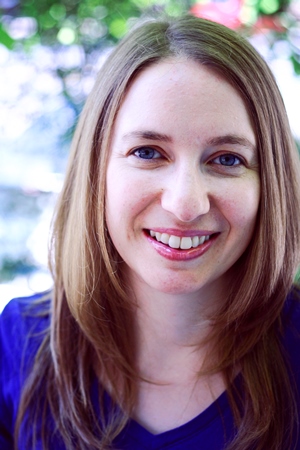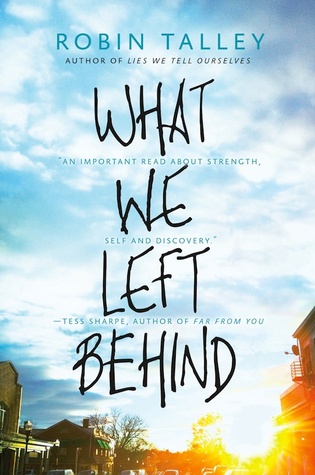2018 School Spending Survey Report
Building Community: Robin Talley on Labels, Gender Identity, and “What We Left Behind”
While young adult literature is finally seeing more trans* protagonists, very few can be categorized as genderfluid or nonbinary. SLJ caught up with Robin Talley to discuss her inspiration for What We Left Behind, the books she wished had existed when she was in high school, and what she’s working on next.

Photo by Courtney Rae Rawls.
School Library Journal: I know why it's significant to many readers that you included a genderqueer character in What We Left Behind, but can you speak to why the inclusion of such a protagonist was important to you? Robin Talley: I’m thrilled I got to tell Toni’s story in What We Left Behind, and it’s wonderful to be able to add to the depressingly small number of teen books out there focusing on characters who are on the trans* spectrum. But in the beginning, I didn’t set out with the specific intention of writing a book with a genderqueer protagonist. Toni and Gretchen, the two leads, originally started out as secondary characters in another book that I wrote many years ago. That first book wound up being permanently trunked, but I loved Toni and Gretchen so much I decided to write their story. When I first started thinking about what their lives would be like in college, I immediately pictured Toni becoming friends for the first time with a group of classmates who were also on the trans* spectrum and beginning a deeper exploration of gender identity. It was a story I was really eager to dive into, and Toni’s my favorite character I’ve ever written. SLJ: Toni spends much of the book struggling to find labels and pronouns that feel comfortable to them. Sometimes Toni and their classmates even wonder if labels should be eschewed altogether, even though it’s labels (trans-, genderqueer, etc.) that have brought them together. Labels build communities and friendships, but they also limit us. Do you ever grapple with similar ideas when you're writing and creating characters? RT: Yes, labels are a constant struggle. My first book, Lies We Tell Ourselves (Harlequin Teen, 2014), was set in 1959 and focused on small-town teens who were completely isolated from any sort of LGBTQ community. Although both of the main characters were queer, they were completely unaware of any labels that would’ve described their sexuality. That was a huge challenge for them and for me in writing their story, partly because my own understanding of identity in my teen years grew in large part from the labels I thought of as my “options”―gay, lesbian, bisexual, etc. Thanks largely to online communities, many teens growing up today are aware of a much broader array of labels than I was as a teen, with words such as demisexual and pansexual as well as terms for gender identity including genderqueer and nonbinary. I think labels can be wonderful for building community, but they can also be challenging for teens (and adults) who feel like they’re expected to pick a set of terms to define themselves, even if they aren’t sure which is really the best fit. That’s definitely something that comes up a lot in What We Left Behind. SLJ: So many YA novels take place during high school, but we meet Toni and Gretchen just as they graduate. What made you center this story on the college experience? RT: I originally conceived of the characters as high schoolers. During those years, though, the deeply-in-love Toni and Gretchen didn’t really face a lot of conflict―their high school relationship was pretty much perfect from the moment they met. But any relationship will be tested when the people in it are thrust into a new environment―especially if they’re being separated and being exposed to new people and ideas that will cause them to reassess how they see the world and their place in it. That all spells college to me! SLJ: None of us is born with expertise concerning gender identity. Did you do any research in preparation for this novel? RT: Yes. Particularly as [I am] a cisgender author writing outside my own experience, it was important to me to learn as much as I could about transgender and nonbinary identities so I could try to write about these characters and their experiences as authentically as possible. A lot of the current dialogue about gender identity takes place online, so in addition to talking with friends about their experiences, reading memoirs and articles, and watching interviews and documentaries, I spent a lot time visiting open online communities to learn more about the politics and ongoing conversations. SLJ: I found myself conflicted watching the post–high school relationship of Gretchen and Toni unfold. Part of me wanted them to finally break up so that they could both evolve and gain some independence, but I also found myself hoping that they could somehow make their love survive. Were you conflicted about the outcome of their relationship? In an ideal world, what kind of lives would you want for them? RT: I was conflicted because I love the high school version of Toni and Gretchen’s relationship, but I was also eager for each of them to learn to stand on their own. I knew from the beginning where the story would go, though. In an ideal world, I think they’d both continue to evolve independently and get more involved in their larger communities—which, in the best-case scenario, is a big part of what college is all about. SLJ: When I was a teen, there weren't many LGBTQ-centric titles in the YA section. I assume the same was for you. Are there any recent YA novels you that wish had been around when you were a teen? RT: This is so enormously true. The books I most wish I’d had access to are Emily Danforth’s The Miseducation of Cameron Post (HarperCollins, 2012) and A.S. King’s Ask the Passengers (Little, Brown, 2012), both of which are coming-out and coming-of-age stories about queer teen girls in small towns whose journeys of self-discovery would’ve had a huge impact on me as a teen, and Alex Gino’s George (Scholastic, 2015), an amazing middle grade book about a fourth grader named Melissa whom everyone mistakenly thinks is a boy named George. I’d love to see all three books made mandatory reading in schools so the next generation can see themselves represented in fiction at a crucial age―or grow up with empathy for people who are different from them. SLJ: Is there anything you read when you were a teen that made an impact, either good or bad? RT: In terms of representation, my teen reading was sadly lacking. I don’t remember reading fiction that included queer characters until I was in college (and even then, it was pretty limited). And the fiction I read that included characters of color was most often framed through the viewpoints of white characters, like To Kill a Mockingbird. That’s one reason why I think it’s so important to support books about diverse characters and books written by diverse authors―because it’s so easy to grow up thinking the majority is the default and to never question that understanding. SLJ: In Lies We Tell Ourselves, you gave us meticulously researched historical fiction. In What We Left Behind, readers were treated to an emotional and highly relatable piece of realistic fiction. What can we expect next from you? RT: My next book will be completely different. It’s called As I Descended, and it’s coming out in 2016. It’s a retelling of Macbeth set at a Virginia boarding school, and it centers on a lesbian power couple who set out to dethrone the school’s resident mean girl. It features vengeful ghosts, ruined friendships, and lots of really poor decision-making.
SLJ: When I was a teen, there weren't many LGBTQ-centric titles in the YA section. I assume the same was for you. Are there any recent YA novels you that wish had been around when you were a teen? RT: This is so enormously true. The books I most wish I’d had access to are Emily Danforth’s The Miseducation of Cameron Post (HarperCollins, 2012) and A.S. King’s Ask the Passengers (Little, Brown, 2012), both of which are coming-out and coming-of-age stories about queer teen girls in small towns whose journeys of self-discovery would’ve had a huge impact on me as a teen, and Alex Gino’s George (Scholastic, 2015), an amazing middle grade book about a fourth grader named Melissa whom everyone mistakenly thinks is a boy named George. I’d love to see all three books made mandatory reading in schools so the next generation can see themselves represented in fiction at a crucial age―or grow up with empathy for people who are different from them. SLJ: Is there anything you read when you were a teen that made an impact, either good or bad? RT: In terms of representation, my teen reading was sadly lacking. I don’t remember reading fiction that included queer characters until I was in college (and even then, it was pretty limited). And the fiction I read that included characters of color was most often framed through the viewpoints of white characters, like To Kill a Mockingbird. That’s one reason why I think it’s so important to support books about diverse characters and books written by diverse authors―because it’s so easy to grow up thinking the majority is the default and to never question that understanding. SLJ: In Lies We Tell Ourselves, you gave us meticulously researched historical fiction. In What We Left Behind, readers were treated to an emotional and highly relatable piece of realistic fiction. What can we expect next from you? RT: My next book will be completely different. It’s called As I Descended, and it’s coming out in 2016. It’s a retelling of Macbeth set at a Virginia boarding school, and it centers on a lesbian power couple who set out to dethrone the school’s resident mean girl. It features vengeful ghosts, ruined friendships, and lots of really poor decision-making. RELATED
RECOMMENDED
CAREERS
The job outlook in 2030: Librarians will be in demand
CAREERS
The job outlook in 2030: Librarians will be in demand
ALREADY A SUBSCRIBER? LOG IN
We are currently offering this content for free. Sign up now to activate your personal profile, where you can save articles for future viewing






Add Comment :-
Be the first reader to comment.
Comment Policy:
Comment should not be empty !!!